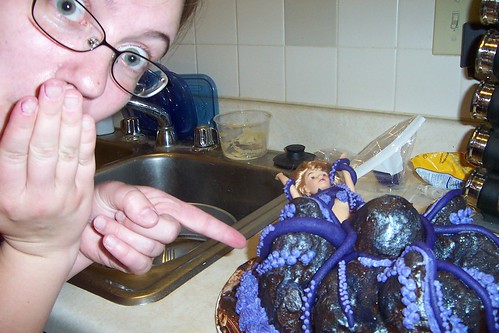I was born in 1984 in the suburbs of Detroit. I have been violently lactose intolerant since I was 13 (although for a while I invented a new radical political faction called anti-lactarianism...we believe that milk is murder...I think we were absorbed into veganism though). Later on in life I started having serious gastrointestinal distress and found out that I have irritable bowel syndrome and am sensitive to MSG and gluten (although my celiac disease test came back negative). I’m also allergic to mangoes.
I believe in the hacker ethic when it comes to food and cooking—this can be hard to explain and has freaked out acquaintances before as they seem to fear that a food hacker would be the kind of person to clone a cow, fill it with nanobots, and then serve it to them cold-seared with aspirin sauce. That is not my deal. I just believe in the radical idea that food should help people.
I was inspired by the work of Richard Stallman, the famous software freedom activist and hacker, to codify my beliefs about food:
The Four Freedoms of Food¹
Freedom 0: to eat the food or to not eat the food.
Freedom 1: to know the detailed origin of the food.
Freedom 2: to grow the food and distribute the food to help your neighbor.
Freedom 3: to cook the food and modify the food and recipe as you see fit, and to redistribute your recipes and methods to the public for the benefit of the community, as long as doing so doesn’t violate freedoms 0, 1, or 2.
Taking inspiration from the Free Software Movement, I believe in free food: free as in free speech, not necessarily as in free beer. In addition to the freedom to grow and eat food, I also believe that people should have freedom from food that they are allergic or sensitive to, or that they are ethically opposed to consuming. That is, your freedom to grow or eat food ends where you put undisclosed allergens in your manufactured food or fish genes into my supposedly vegan tomato.
¹These are based on the Four Freedoms of Code: 0—The freedom to run the code, for any purpose; 1—the freedom to study how the program works, and adapt it to your needs; 2—the freedom to redistribute copies so you can help your neighbor, and 3—the freedom to improve the program and release it to the public so that the whole community benefits. See Chapter 3, Free Software Definition, in the collected works of Richard M. Stallman, available online for free:
http://www.gnu.org/philosophy/fsfs/rms-essays.pdf

No comments:
Post a Comment